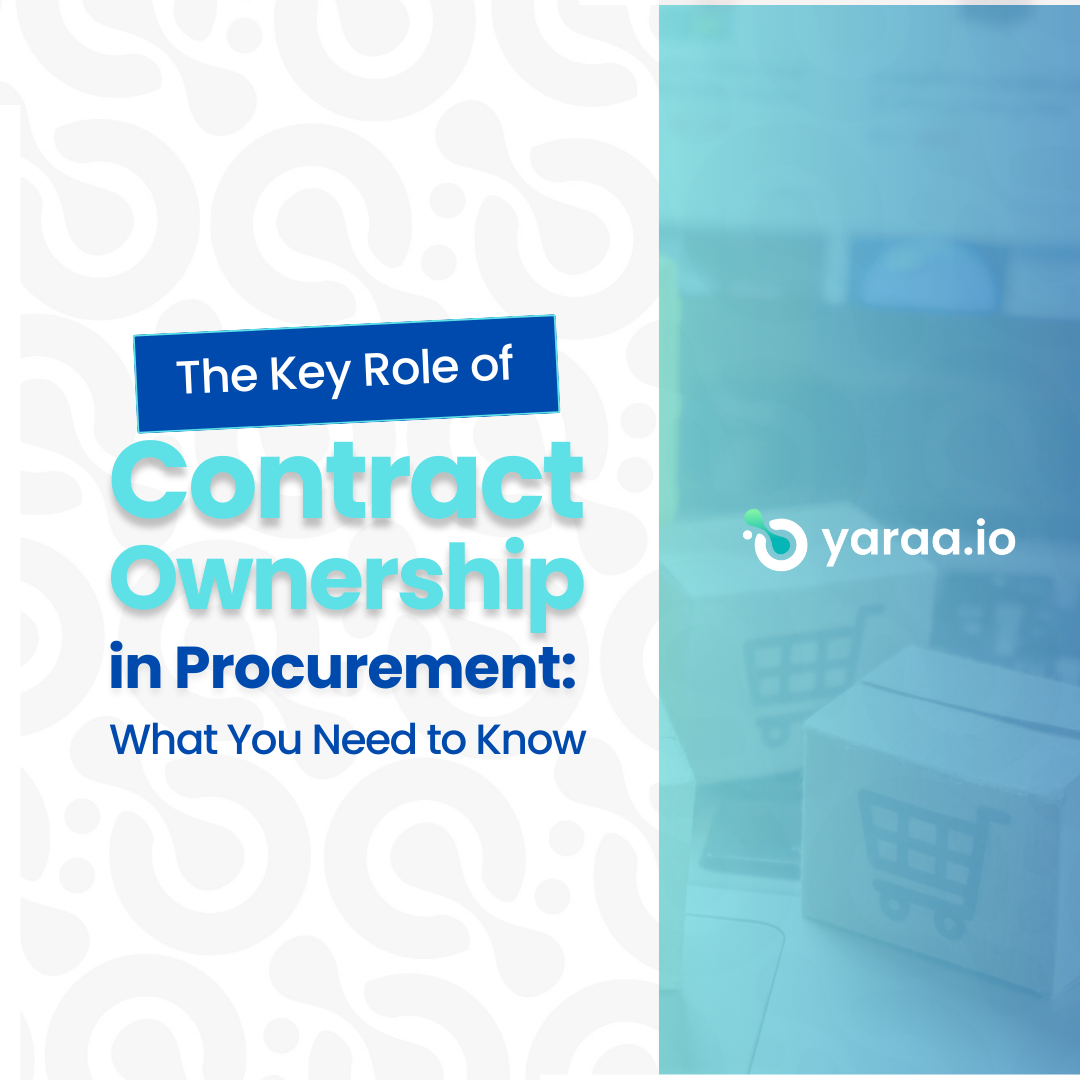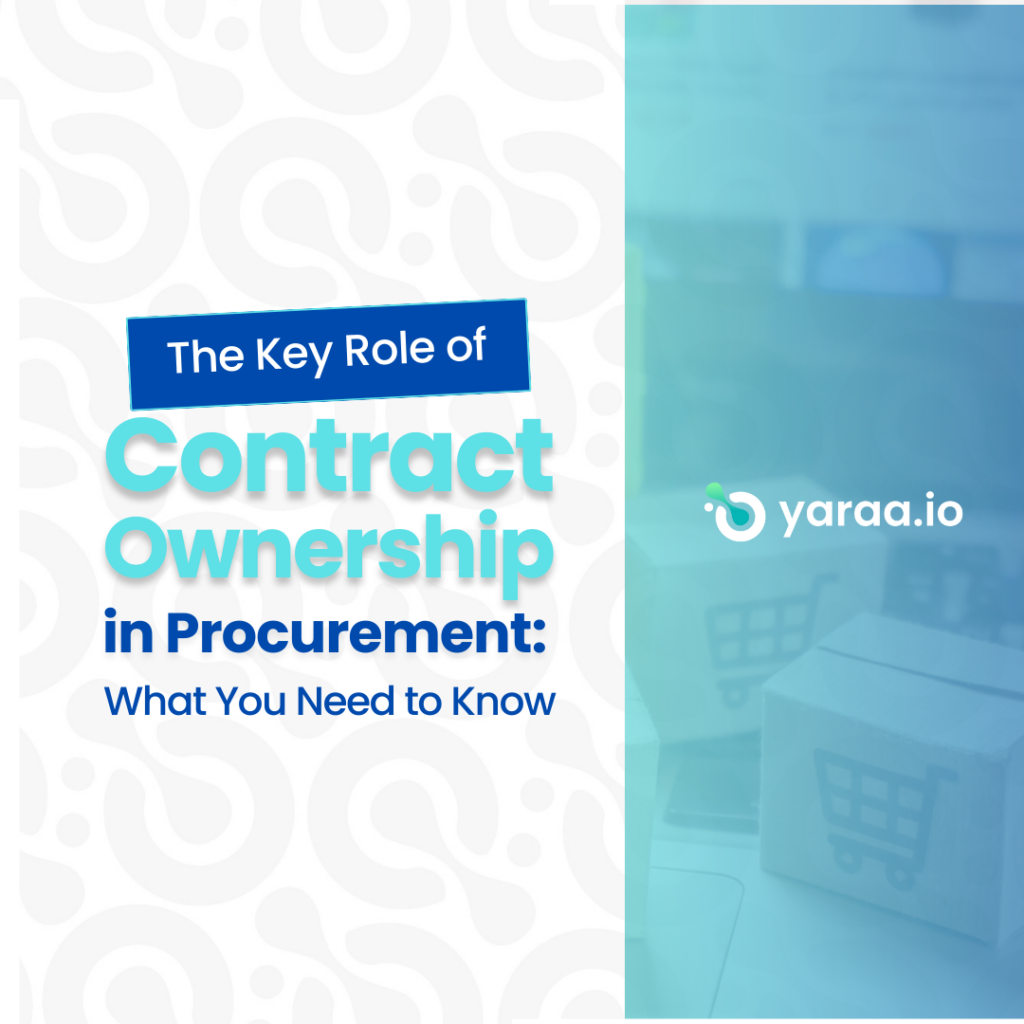
What is Contract Ownership?
In the intricate world of procurement, contracts serve as the backbone, governing an astounding 70% to 80% of business operations . This critical role underscores the necessity for meticulous contract ownership, a concept that promises to transform procurement processes through enhanced efficiency and strategic management. As the landscape of procurement continues to evolve, embracing contract ownership is no longer just an option—it’s imperative for businesses aiming to achieve innovation and quality.
At its core, contract ownership refers to the individuals or teams responsible for overseeing a contract from its inception to its closure. These contract owners act as guardians of the contract lifecycle, ensuring that every phase proceeds smoothly and effectively.
Who Are Contract Owners?
Typically, contract owners are the individuals or teams who initially requested the goods or services and have ongoing interactions with the supplier. They sit at the heart of the contract management process, playing a crucial role in ensuring that the agreement fulfills its intended purpose. Without dedicated contract owners, agreements can quickly fall into disarray—leading to stagnation, misunderstandings, and even costly disputes. Within this text, we will proceed to discuss the key role of contract ownership in procurement.
Enhancing Contract Oversight for Better Quality Control
Effective contract oversight is pivotal in ensuring superior quality control across procurement processes. Unfortunately, businesses lose an average of 9.2% of their annual revenue due to contract mismanagement , a figure that skyrockets to 15% for larger enterprises. This staggering loss emphasizes the need for enhanced oversight. The integration of automated contract management systems can significantly mitigate such risks, accelerating negotiation cycles by 50% and cutting down inaccurate payments by an impressive 75% to 90% . By ensuring contracts are meticulously managed and supervised, businesses can uphold the highest standards of quality, thereby fortifying their procurement strategies.
Ensuring Project Success Through Strategic Contract Management
Strategic contract management stands as a linchpin for achieving project success. When managed correctly, contracts can drive substantial cost savings, enabling organizations to potentially reduce annual costs by up to 2% by leveraging efficient contract management practices. However, accessibility and management remain significant hurdles; 71% of companies struggle to locate 10% or more of their contracts, leading to costly penalties and missed opportunities for renewals. Implementing a strategic approach to contract management can mitigate these challenges, ensuring that contracts are not only accessible but also actively managed for optimal performance.
By adopting robust contract management systems, organizations can streamline contract administration, reduce the risk of non-compliance, and safeguard against financial setbacks. Strategic management also allows for better alignment with organizational goals, ensuring that each contract contributes to overarching business objectives. This focus on alignment enhances not only project outcomes but also fosters stronger supplier relationships, which are essential for long-term success.
Investing in strategic contract management tools and practices can position an organization to preemptively address potential issues and capitalize on favorable terms, thus maximizing the value derived from each contractual agreement. This proactive stance is integral to sustaining project momentum and ensuring consistent, high-quality results in procurement operations.
Early Issue Detection and Mitigation Strategies
Early issue detection is paramount in procurement to maintain seamless project progression and prevent costly setbacks. Given that the contract process itself accounts for 18% of the entire selling cycle, it’s clear that considerable time and resources are invested in this critical phase. Implementing proactive mitigation strategies can significantly enhance the efficiency of procurement operations. By identifying potential issues early in the contract lifecycle, organizations can address and rectify problems before they escalate into major disruptions.
Utilizing advanced contract management systems can aid in the early detection of issues, offering predictive analytics and real-time monitoring. This technology enables procurement teams to swiftly respond to emerging risks, ensuring that contracts remain on track and aligned with organizational goals. Additionally, fostering a culture of continuous improvement within the procurement function can lead to better issue detection and resolution strategies.
Collaborating closely with suppliers and stakeholders is also vital. Regular communication and performance reviews can help identify any deviations from contract terms early on, allowing for timely corrective actions. This proactive approach not only streamlines the contract process but also enhances overall procurement efficiency, ensuring that projects proceed smoothly and deliver maximum value.
Maximizing Value for Money with Effective Contract Oversight
The pursuit of maximizing value for money is a cornerstone of effective procurement, and diligent contract oversight is pivotal in this endeavor. Over the past six years, the average cost associated with authoring and signing low-risk contracts has surged by 38% , underscoring the growing need for cost-effective management practices. By refining contract oversight processes, organizations can streamline expenditures and optimize returns on investment, thus ensuring they derive maximum value from every contractual agreement.
Implementing advanced contract management systems is one of the key role of contract ownership in procurement and it can significantly enhance oversight, enabling real-time tracking and performance analytics. These tools not only facilitate better compliance but also support the identification of cost-saving opportunities. Additionally, regular audits and reviews of contract terms can help uncover inefficiencies and areas for improvement, allowing organizations to renegotiate terms and enhance the overall value of their procurement activities.
A proactive approach to contract management also involves fostering strong relationships with suppliers. By maintaining transparent and collaborative communications, businesses can negotiate more favorable terms and achieve better outcomes. This strategic focus on value extraction not only boosts financial performance but also strengthens the company’s competitive position in the market. Embracing effective contract oversight is thus essential for any organization looking to enhance its procurement strategy and ensure sustainable, long-term success.
The Strategic Importance of Contract Ownership in Procurement
In today’s dynamic procurement environment, the strategic significance of contract ownership cannot be overstated. Emerging technologies promise to transform contract management, predicting that by 2024, 50% of manual efforts in contract review and drafting will be significantly reduced.
The reduction of manual tasks through advanced systems allows procurement professionals to shift their focus toward more strategic initiatives. This shift ensures that contracts not only meet compliance standards but also align with broader business objectives. Organizations that embrace these technological advancements are better positioned to optimize their procurement processes, driving innovation and efficiency.
Moreover, owning the contract process end-to-end enables organizations to preempt potential risks and seize favorable opportunities swiftly. By maintaining tight control over contract terms and performance, businesses can foster stronger supplier relationships, streamline procurement activities, and achieve more favorable outcomes.
As these technologies evolve, the role of contract ownership in procurement will extend beyond mere documentation to becoming strategic tools that support business growth and sustainability. Leveraging contract ownership effectively means turning contracts into powerful assets that contribute to achieving long-term organizational goals.
Also Read: The Benefits Of Using Technology In Inventory Control
In summary, the strategic importance of contract ownership lies in its ability to revolutionize procurement processes, making them more efficient, aligned, and forward-thinking. This proactive approach not only enhances operational performance but also positions organizations at the forefront of industry innovation, ensuring they remain competitive in an ever-changing market.
Automating Contract Management
The advent of automated contract management systems is revolutionizing procurement processes by enhancing efficiency and reducing human error. The contract management software market is projected to reach a valuation of $12 billion by 2025 , underscoring the growing reliance on these advanced tools. Automation eliminates manual tasks, such as drafting and reviewing, which are both time-consuming and prone to errors, enabling contract managers to focus on more strategic initiatives.
These systems offer real-time tracking and predictive analytics, which allow organizations to monitor contract performance and identify potential issues before they escalate. This level of oversight ensures that contracts remain compliant and aligned with business objectives. Furthermore, automated systems can streamline negotiation cycles, improve accuracy in payments, and enhance overall contract visibility. This is one of the many revolutionary functionalities of the Yaraa Ecosystem.
By integrating automated contract management, companies can achieve substantial cost savings and optimize their procurement strategies. The efficiency gained from these systems not only reduces operational costs but also bolsters the company’s competitive edge. Embracing automation is a strategic move that promises to transform contract management into a powerful asset for driving innovation and ensuring long-term success in procurement.
To ensure that your organization stays at the top of your industry, implementing a contract management solution to aid in automating all contract activities and maintaining contract ownership, book a demo to see how Yaraa’s Contract Management solution can be a best fit for your contract needs.
